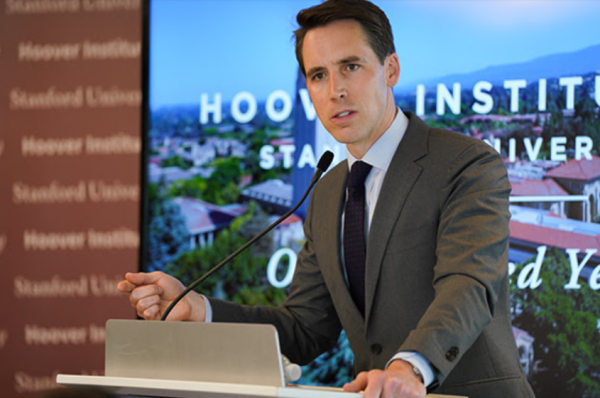Sen. Hawley Blasts Social Media as Unproductive 'Peril'

The smarter way to stay on top of broadcasting and cable industry. Sign up below
You are now subscribed
Your newsletter sign-up was successful
First-year senator Josh Hawley (R-Mo.), who has made hammering Big Tech his signature issue, provided a Hoover Institute audience Thursday with a dystopian view of social media as an addiction that imperils its users and "sucks" the brightest minds to the coasts--abandoning flyover country--and said it provides "little or no productive value to the United States economy."
The strength of his condemnation evoked Hill attacks on violent video games and indecent broadcast content and gory comic books from legislators past.
Related: Sen. Hawley Says Twitter Should Submit to Third-Party Audit
Hawley said that social media poses many novel problems and they are in need of addressing, but they are downstream from a bigger question: Just what are social media giants worth. His answer is that in the balance of cost benefit, they come out wanting.
Hawley said one of the chief problems is how social media platforms keep the virtuous internet garden "pruned," as in free of criminal activity and "other vices," without "inserting their own political or content biases."
Another is just what competition looks like. The Department of Justice is also wrestling with that issue under pressure to crack down on social media giants and as it looks at whether to include online advertising in the relevant competitive market of traditional broadcast and cable outlets when it comes time to vet mergers or look at anticompetitive conduct.
Related: Sen. Hawley Keeps Hammer Down on Google
The smarter way to stay on top of broadcasting and cable industry. Sign up below
He called those "the questions of the day on Capitol Hill" and the subject of serious debate. But he said a bigger issue is trying to figure out what those social media platforms are worth to society and the economy.
Hawley said the evidence suggests that there is something deeply troubling, even deeply wrong with the "entire social media economy," and that rather than being a source of strength, it is instead "a source of peril."
"One of the most difficult things about acting in this area is the fear that any significant change in this space, any significant adjustment to the rules of the road, whether it be privacy requirements or content requirements, might end up stifling Silicon Valley, which we are accustomed to regarding -- certainly we’re told -- as the great Crown Jewel of the American economy. But is it? Is this really the best that our best minds have to offer?”
He said the way to view social media is as what he calls "attention arbitrage" which is that Web users' attention is the commodity sold to the highest advertising bidder, a model that does not lead to long-term economic growth.
He said the scary part of the equation is that such arbitrage is preserved by "hijacking users’ neural circuitry to prevent rational decision making about what to click and how to spend time. Or, just to simplify that a little bit, it’s preserved through addiction."
"Social media only works as a business model if it consumes users’ time and attention day after day after day," he said. "It needs to replace the various activities we did perfectly well without social media, for the entire known history of the human race with itself.
"Many studies now suggest that the time spent on social media and on social media platforms at least correlates to some degree with increased depression and loneliness. All of these social consequences, these are significant, you might even say that they are severe, and the question we need to be asking is, 'What is the role of social media in driving them, in encouraging them, in promoting them, and is this really something that is good for our society in the long term, or for our economy for that matter?'”
Hawley invoked surges in teen suicides and the epidemic of depression as other possible byproducts of new tech, specifically the rise of the iPhone. He conceded it could be coincidence, not causation, but cited studies suggesting a correlation with growing social media presence and that awful "social media" consequence.
As to the economy, he suggested app and platform designers might have better spent those bright minds on a discipline that provided little or not productive value." He said social media was "sucking" the best engineering minds from communities "that need their talents" to "outposts on the coasts," forgetting the people they left behind.
Contributing editor John Eggerton has been an editor and/or writer on media regulation, legislation and policy for over four decades, including covering the FCC, FTC, Congress, the major media trade associations, and the federal courts. In addition to Multichannel News and Broadcasting + Cable, his work has appeared in Radio World, TV Technology, TV Fax, This Week in Consumer Electronics, Variety and the Encyclopedia Britannica.

